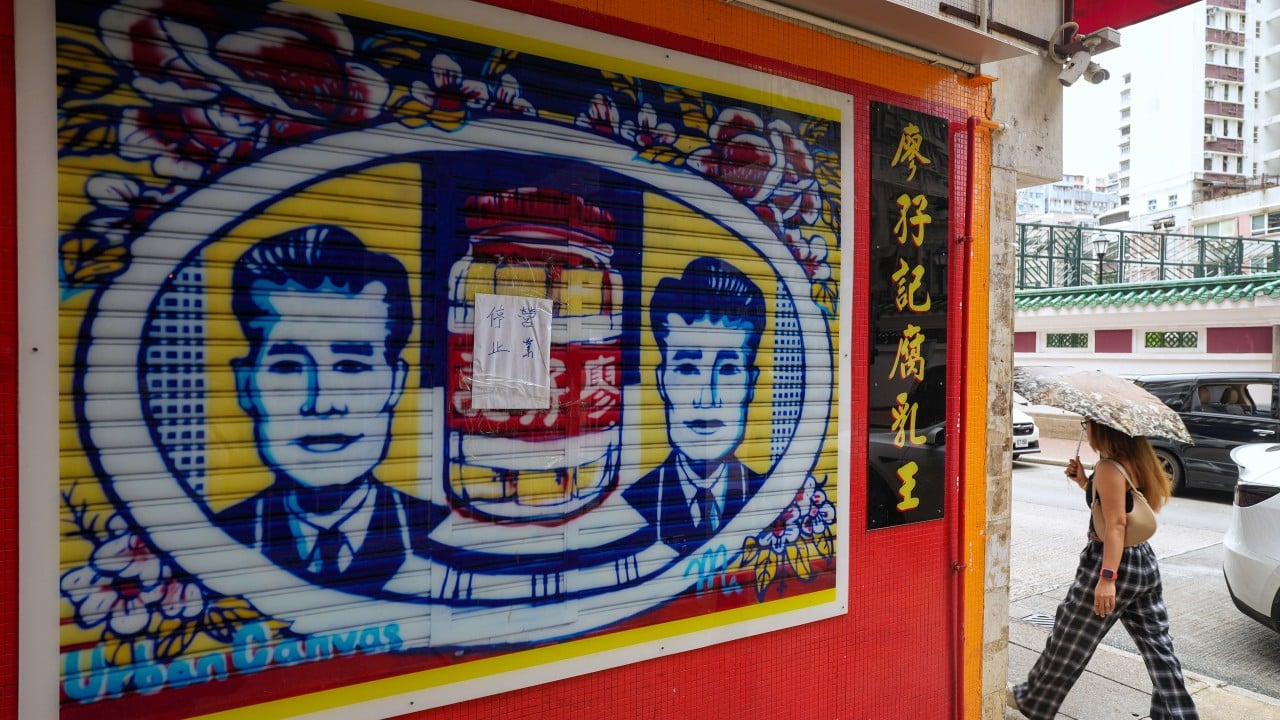Liu Ma Kee, a fourth-generation business in Hong Kong’s Yau Ma Tei neighbourhood known for its fermented tofu products, has found itself in deep water over a row that dramatically escalated last week. The weeks-long controversy first started with a warning from health authorities that its sample contained an excessive amount of Bacillus cereus . The shop with almost 120 years of history challenged the findings and announced its abrupt closure, drawing plenty of sympathisers.
It was not until Saturday when the Centre of Food Safety dropped a bombshell revealing Liu Ma Kee had imported preserved bean curd rather than manufacture its own, and resold it with additives introduced under poor hygiene conditions. The shop eventually admitted on Monday that it had been importing the fermented bean curd from mainland China for 30 years ago and apologised to authorities for overreacting to the saga. The Post unpacks the fall of the city’s renowned household brand and traces how the saga unfolded.

Liu Ma Kee, which was founded 119 years ago, started as a shop selling various items such as fermented tofu products and sprouts. It decided to focus solely on selling fermented bean curds – its most well-known products – since 1971. Known as fuyu, fermented tofu is a traditional Chinese condiment made by processing and fermenting the soy product with salt, rice wine and flavourings.
The finished product has a distinctive pungent aroma and yielding texture that has been likened to ripe soft cheese. The family-owned business was even featured in a Hong Kong Tourism Board campaign in 2021 aimed at boosting travel to the city by spotlighting heritage businesses and hidden gems. Its products were also sold in other Southeast Asian countries, the United States and Europe and Australia.
On July 4, the Hong Kong government’s Centre for Food Safety published an alert warning that tests on a batch of bottled fermented bean curd taken from a Sai Ying Pun retailer had shown unsatisfactory levels of bacteria Bacillus cereus . Test results had shown that the sample contained Bacillus cereus at a level of 130,000 per gram – the threshold for safe consumption is 100,000 per gram. Liu Ma Kee followed instructions to recall the affected batch.
On July 16, a subsequent report issued by the centre on July 16 announced that a new sample taken from a bottle of Liu Ma Kee fermented bean curd with a best-before date of August 7, 2025, was found to have a Bacillus cereus level of 1,300,000 per gram – 12 times the recommended level for safe consumption. Authorities on Saturday also revealed on Saturday the hygiene of the factory was in question, pointing to dust and rust found in the packaging area of the premises. Some of the diluted rose wine had also been stored in a plastic bucket at room temperature for three days beside other sundries.
After food safety authorities issued their first warning against the products, Mrs Liu, mother of Jay Liu Fong-yip, the fourth generation of the family, contacted Scoop, a Hong Kong television programme broadcast by TVB, to air her concerns about the investigation results. She argued her family business was unfairly targeted, claiming a second test of another sample had produced a satisfactory result. The appeal drew support from some quarters, as they lamented how a small local company suffered from the government reports.
Some of them even compared the episode with another incident involving the city’s consumer watchdog, which had apologised not long ago to the country’s largest bottled water company for an inaccurate safety report. But the saga took a turn on Saturday, when the Centre of Food Safety revealed that it found the century-old shop did not produce any of its own white fermented bean curd, but only added rose wine and other seasonings to the bean curd it bought from another soybean factory. The revelation sent shock waves across the city, fuelling questions over the integrity of Liu Ma Kee which had already emphasised its products were produced in Hong Kong.
Jay Liu, the fourth generation of Liu Ma Kee, pushed back against criticism from internet users. Liu on Monday argued the sample taken by the food safety authorities – which eventually found the Bacillus cereus level 12 times the recommended level for safe consumption – was actually “tailor-made” for the centre’s staff based on authorities’ suggestions, given it had already suspended the manufacturing of the fermented bean curd after the first warning. He claimed authorities’ suggestion to add hot water at 120 degree celsius to the bean curd was not feasible, given it created lots of water vapour due to the temperature difference.
On the radio programme, Liu also conceded the shop was forced to import bean curd from mainland China for the past 30 years ago instead of manufacturing its own, due to its failure to comply with tightened sewage regulations. But he still insisted that the products were locally made with the additions being done at its factory. Some angry Hongkongers took aim at the shop, accusing it of keeping customers in the dark that the fermented bean curd it produced was actually manufactured on the mainland.
They were particularly upset by what they perceived as the lack of integrity, stemming from what the shop owners had told the press in previous interviews years ago, which suggested that Liu Ma Kee made the fermented tofu from scratch. In a video featuring its business in 2022, the family members said in the interview that the shop insisted on a “handmade” process for its fermented tofu, starting from soaking soybeans, turning it into tofu and letting it ferment. One internet user argued it was especially unacceptable that Liu Ma Kee stressed it was a “local, century-old brand” because that was deceiving customers.
But a few others pointed out that it was increasingly common for food to be made across the border, and they would still continue to support the brand..



















